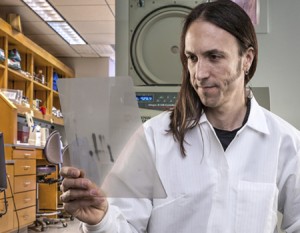I wrote three stories for the UCSF School of Medicine home page in December about how clinical departments are increasingly hiring scientists who conduct basic research, and this collaboration is leading to greater discoveries. This story is a profile of Mark Ansel, the new director of UCSF’s Biomedical Sciences Program (BMS). The mainbar looks at some particularly fruitful collaborations, and another sidebar focuses on the hiring process.
Mark Ansel Takes Helm at BMS
By Dan Fost

UCSF Photo: Majed Abolfazli
It was not all that long ago that Mark Ansel was a student in UCSF’s Biomedical Sciences Program (BMS). Ansel earned his doctorate in the program in 2001, when he worked in the lab of Jason Cyster, PhD.
Ansel then spent six years at Harvard Medical School as a postdoctoral fellow and instructor before returning to UCSF in 2008 as a professor. This year, Ansel became the director of the BMS program, succeeding Cyster, and bringing to the role not only his experience as a student and faculty member, but also a keen scientific mind.
“It’s a fantastic thing,” said Keith Yamamoto, PhD, Vice Chancellor for Research and Executive Vice Dean of the School of Medicine. “Here is a product of that very program, who is able to use the fruits of what he’s learned and the way he’s learned it, to have the vision, the insight and the willingness to lead, to come back and move the program forward. For him to come back now and serve as leader closes the loop. Mark is fantastic and we are incredibly fortunate that he’s willing to take it on.”
Cyster, a Howard Hughes Institute investigator, has returned his full focus to his lab in the Department of Microbiology and Immunology, after 10 years of service as BMS director. Yamamoto hailed Cyster as “a spectacular leader for the BMS program.”
Milestone Year for BMS
BMS will mark its 25th anniversary in 2015, and has been led over the years by such luminaries as Zach Hall, PhD, Don Ganem, MD, and Henry Bourne, MD. “It was created as a program that would purposefully train PhD students in disease-relevant research,” Ansel said.
That visionary notion “may not have been a sign of the times then,” Ansel said, “but now, with the focus on health-relevant research and human biology, BMS has come into its own. The NIH has caught up to us. It fits the direction that biological research is taking.”
Twenty-five years ago, the departments that now make up BMS each worked in their own silos, but now, Ansel said, they’re much stronger together. “It just makes sense,” he said. “Once you realize that the genome has one code in all of our cells, it becomes obvious if you study immunology, or tissue biology, or neurobiology that it’s all the same language of biology. We have a lot to learn from each other.”
BMS has grown tremendously over the years, with around 150 students today. It recruits 25 students per year and has about 250 faculty associated with the program, with approximately 130 of those serving as active mentors.
Dedicated to Knowledge & Helping Others
Ansel, 40, is a native of Pennsylvania Dutch country. He went to Virginia Tech thinking that he would become an engineer, but in his biology classes, “I got excited about research – the kind of learning where you couldn’t get the answer in the back of the book.”
He became interested in immunology because of the HIV epidemic, and after earning his bachelor’s degree, he headed west to UCSF for his PhD research. He followed his basic research training and interests in immunology into asthma, where his work remains focused today. While some researchers are inspired by a relative or friend to pursue a certain disease, Ansel had not particularly been touched by asthma. However, he found that asthma and allergies were one of the most fruitful areas for a specific type of scientific inquiry. He said, “I was interested in how cells get programmed to mediate different types of immune responses.”
“I can get excited about science for science’s sake. It gets me up in the morning just fine,” Ansel said. “But it gives me extra motivation to think that the work that we do could help people.”